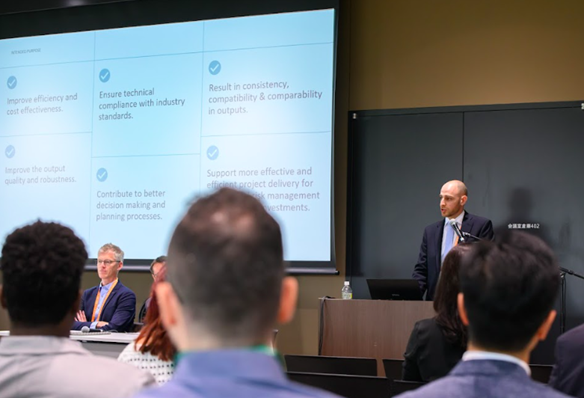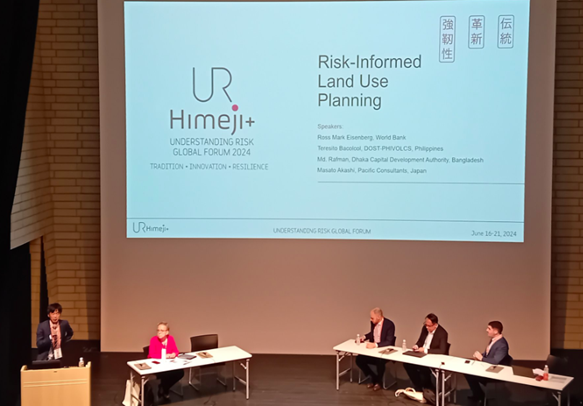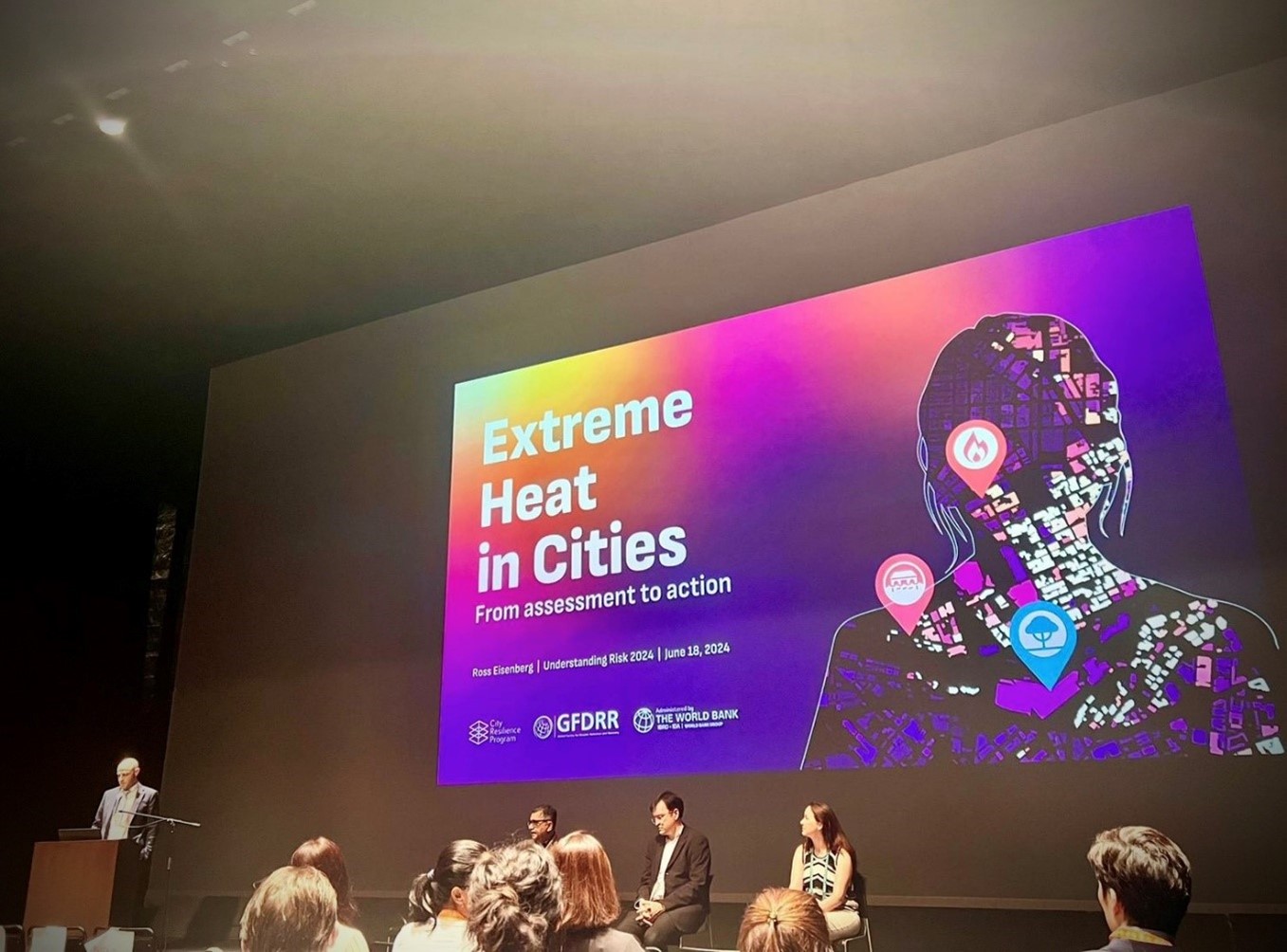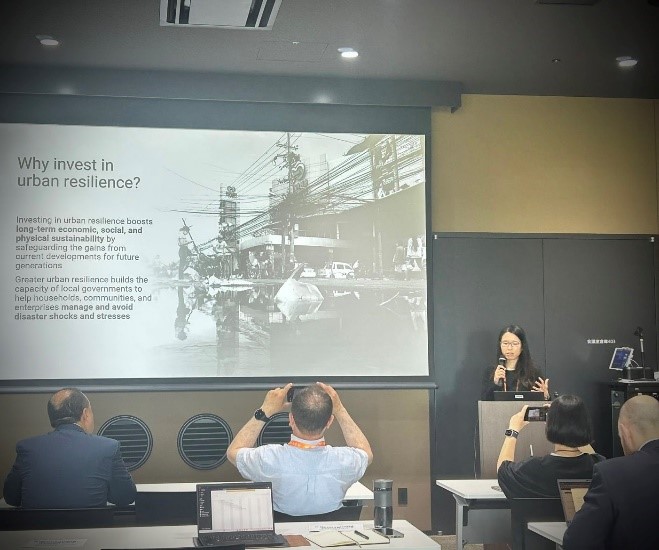Understanding Risk (UR) is a global community of experts and practitioners in disaster risk management. Every two years the community meets at the UR Global Forum. Members from the public sector, NGOs, private sector, academia, and more share knowledge and experience, and discuss innovations in assessing and reducing risks.
Understanding Risk 2024 (UR24) in Himeji, Japan (16th-21st July) was the largest in-person Understanding Risk Global Forum to date, with more than 1,700 participants. The conference promoted unique exchanges with the Japanese experience, traditions, and innovations in the field of disaster risk management.
CRP's contribution to UR2024 included technical sessions on adapting to and mitigating extreme urban heat, democratizing urban flood risk assessment, scenario planning for urban adaptation to different climate change futures, and more. The sessions CRP led ran participatory exercises in risk-informed planning, presented the Urban Flood Risk Handbook, showcased heat mapping campaigns in the Western Balkans and South Africa, and illustrated CRP’s work to enhance urban resilience in Central Asia and the Pacific.
CRP was the leading voice on the challenges of urbanization and climate change at UR24. CRP promoted urban resilience at the UR in particular through six sessions:
1. Making Urban Flood Protection More Accessible: Decoding Risks and Democratizing Assessment
Flooding in urban areas is one of the most significant climate resilience challenges cities face. It is also an extremely complicated problem to assess, requiring both deep technical expertise and complex engagement with many stakeholder groups.
At this session, CRP presented the guidance found in the Urban Flood Risk Handbook, and technical experts and government partners shared innovations for understanding and addressing urban flood risk. CRP provided guidance for implementing and managing an assessment of urban flood risk in cities and scaling flood risk assessment in practice in developing countries. The session also showcased key innovations from three leading firms in the field of flood risk assessment, and immersed the audience in a role playing exercise to better engage with the challenges that stakeholders in the field face.
Speakers: Seyi Mkinde, Governor, Oyo State, Nigeria; Philip Ward, Senior Climate Adaptation and Disaster Risk Management Specialist, Deltares; Blair Spendelow, Technical Director, JBA Consulting; Karel Heijnert, Senior Water Management Consultant, Royal Haskoning DHV; Ross Eisenberg, Disaster Risk Management Specialist, City Resilience Program, World Bank.

Ross Eisenberg, Disaster Risk Management Specialist, City Resilience Program, World Bank
2. Risk Informed Land Use Planning for Livable and Resilient Cities
What we build, and where, has a huge impact on the risks we face from disasters. That is why risk-informed land use planning is a critical tool for reducing existing risk, preventing new risk, and building resilience to disasters and climate change.
At this session, CRP presented a preview of the forthcoming Handbook on Risk-Informed Land Use Planning, delving into the challenges of key geological, hydrometeorological, and environmental hazards and offering practical and accessible ways for practitioners to conduct better land use planning in risk-sensitive ways. This guidance was supported by expert practitioner presentations on best practices for risk-informed land use planning through innovative cases in the Philippines, Bangladesh, and Japan.
Speakers: Teresito Bacolcol, Director, Department of Science and Technology, Philippine Institute of Volcanology and Seismology; Masato Akashi, Chief Consultant, Pacific Consultants; Ignacio Urrutia, Senior Disaster Risk Management Specialist, World Bank.
Moderators: Ross Eisenberg, Disaster Risk Management Specialist, City Resilience Program; Ana Campos, Lead Disaster Risk Management Specialist, World Bank.

Masato Akashi, Chief Consultant, Pacific Consultants; Ross Eisenberg, Disaster Risk Management Specialist, City Resilience Program, World Bank; Teresito Bacolcol, Director, Department of Science and Technology, Philippine Institute of Volcanology and Seismology; Ignacio Urrutia, Senior Disaster Risk Management Specialist, World Bank.
3. Extreme Heat in Cities: From Assessment to Action
Heat waves are becoming more frequent and intense due to climate change and the urban heat island effect. But cities around the world are stepping up action on heat resilience, generating rich evidence of “what works” and a growing range of methodologies that can be applied across world regions.
The panel in this session shared their knowledge about extreme heat risks and impacts, assessment methodologies, implementation of heat mitigation policies and investments. The panelists presented on advances in measuring and modeling extreme heat, shared lessons from a Heat Action Plan in India that is credited with saving 1,000 lives per year, and provided guidance for cities getting started on heat resilience from the perspectives of cities who are already on their way.
Speakers: Daniel Sullivan, Director, Risk and Resilience, City of Cape town; Dileep Mavalankar, Former Director, Indian Institute of Public Health; Nuala Cowan, Disaster Risk Management Specialist, GFDRR, World Bank. Moderator: Ross Eisenberg, Disaster Risk Management Specialist, City Resilience Program, World Bank.

Ross Eisenberg, Disaster Risk Management Specialist, City Resilience Program, World Bank; Dileep Mavalankar, Former Director, Indian Institute of Public Health; Daniel Sullivan, Director, Risk and Resilience, City of Cape Town; Nuala Cowan, Disaster Risk Management Specialist, GFDRR, World Bank.
4. Global Mayoral Roundtable on Urban Climate and Disaster Resilience
In the face of increasingly frequent and intense urban shocks and stresses, city mayors play a pivotal role in shaping policies and strategies for urban climate and disaster resilience. Cities are becoming more densely populated and interconnected than ever before. While this phenomenon presents numerous social and economic opportunities, it also exposes cities to greater vulnerabilities.
In this session organized by CRP, mayors from around the world exchanged effective climate and disaster risk management strategies. Insights on the importance of being proactive in urban climate resilience were shared by the mayors of Himeji, Japan; Matosinhos, Portugal; and Palu, Indonesia in this plenary panel discussion. Opening remarks were made by Guangzhe Chen, and Ming Zhang moderated the roundtable.
Participants: Hideyasu Kiyomoto, Mayor, Himeji City, Japan; Luisa Salgueiro, Mayor, Matosinhos City, Portugal; Hadianto Rasyid, Mayor, Palu City, Indonesia;

Ming Zhang, Global Director, World Bank; Luisa Salgueiro, Mayor, Matosinhos City, Portugal; Hadianto Rasyid, Mayor, Palu City, Indonesia.
5. Charting the path to resilient and low-carbon cities through scenario modeling and informed decision-making
Advancements in technology offer unprecedented opportunities to inform urban planning, transform urban infrastructure, enhance service delivery, reduce climate and disaster risks, and improve the quality of life for urban residents.
In this session, CRP shared, for the first time with an international audience, the latest urban profiles developed for the 48 largest urban areas of Central Asia, a region significantly affected by climate change, resource constraints, and rapid urbanisation.
The session included interactive activities that enabled the participants to explore the performance of selected Central Asian cities under different future modeled scenarios across a range of policy levers.
Speakers: Sadi Samadzod, Director, State Unitary Enterprise “Smart City” under Dushanbe administration (Tajikistan); Zhanar Gabdullina, Deputy Chairman, Almaty Development Centre, JSC (Kazakhstan); Ricardo Ochoa Sosa (CAPSUS S.C.); Charles-Antoyne Hurstel, Finance Specialist, City Resilience Program, World Bank; Rui Su, Urban Resilience Analyst, City Resilience Program, World Bank;
Moderators: Chyi-Yun Huang, Senior Disaster Risk Manager Specialist, World Bank; Ross Eisenberg, Disaster Risk Management Specialist, City Resilience Program, World Bank

Rui Su, Urban Resilience Analyst, City Resilience Program, World Bank
6. The Island Advantage: Strategies for Resilient Urbanization in Small Island Developing States
In the context of increasingly extreme weather events and socio-economic challenges, a multi-dimensional approach to urbanization is crucial. Atoll countries, including the Republic of the Marshall Islands, Republic of Maldives, Republic of Kiribati, and Tuvalu, are especially vulnerable, as these low-lying countries face significant climate and disaster threats and pressures on scarce land and require specialized planning and significant action.
Led by officials from atoll nations and development funders, this session detailed how these nations are rethinking their approach to sustainable development. The session highlighted key findings from a proposed investment program in Kiribati, a forthcoming The World Bank study, "The Island Advantage: Strategies for Resilient Urbanization in the Pacific," and how the CRP’s City Scan can be a powerful analytical tool for modelling and measuring local spatial data when planning for urban resilience.
Speakers: James Myazoe, Republic of the Marshall Islands; Ahmed Aiman Shareef, Republic of Maldives; Naomichi Murooka, Japan International Cooperation Agency; Jessica Schmidt, Urban Specialist, World Bank; Rui Su, City Resilience Program, World Bank.
Moderator: Jian Vun, World Bank

James Myazoe, Republic of the Marshall Islands.
